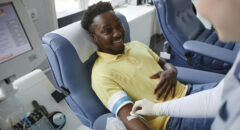
Though it’s important to treat prostate cancer as quickly as possible, you can’t ignore the fact that there are potential side effects. One side effect is that you might have trouble with maintaining an erection without some kind of intervention. Fortunately, there are many ways that you can go back to having a healthy sex life after undergoing treatment for prostate cancer.
Why Treatment Can Affect Your Sex Life
There are three common treatment methods for dealing with prostate cancer. One is hormone therapy, which reduces the levels of testosterone and dihydrotestosterone in your body. While doing this can halt or slow the progress of your tumor, it can also cause sexual dysfunction. Hormone therapy can result in a lower desire for sex, an inability to have an erection, or an inability to reach orgasm.
The second option is radiation therapy, which uses radiation to kill the cells of the tumor. Unfortunately, 50 percent of the people who undergo this form of treatment report developing erectile dysfunction. The numbers are fairly similar for the third treatment option for prostate cancer - chemotherapy. This is a form of treatment where drugs are used to kill cancer cells. Since these drugs can’t be targeted, though, they can damage healthy cells as well.
Finally, some people with prostate cancer may have to be treated with a prostatectomy. This is a type of surgery where your prostate is removed. Your prostate rests close to nerves and muscles that contribute to an erection. These nerves also have a role to play in sexual pleasure. Once your prostate has been removed, it can be difficult to achieve the same level of arousal and climax for some time.
RELATED: 7 Things To Expect After Prostate Cancer Surgery
Common Treatments To Improve Your Sex Life
Though there are treatments for the sexual dysfunction that follows addressing prostate cancer, penile rehabilitation is usually recommended before you start any of them. In this form of rehabilitation, doctors focus on increasing the flow of oxygen and blood in the penis. The plan is to preserve the structures of erectile tissue so you don’t suffer from long-term damage. A lot of this rehabilitation entails regular stimulation of the penis.
Once you’ve done penile rehabilitation, your doctor will discuss your options for medical treatment. There are drugs that you can take orally to increase the likelihood of an erection. Some of them can also be inserted into the tip of the penis to influence blood flow in that way.
Additionally, your doctor can teach you how to inject certain medications directly into the penis. While this method might not appeal to those who are afraid of needles, it’s the most effective way to regain function if oral medication doesn’t work.
If medications aren’t working for you, then you can consider a penis pump. These devices work by drawing blood into the penis to help you get an erection. There’s typically a rubber ring that you can place at the base of your organ to keep the blood in place until you’re done. The final treatment option is to surgically place an implant in your penis. You can choose between a malleable or inflatable prosthesis.
How Lifestyle Changes Can Help
Apart from undergoing treatment for erectile dysfunction, there are some lifestyle changes that your doctor might recommend. These include staying away from alcohol and cigarettes. It also helps to be physically active. One specific exercise that can assist in your rehabilitation is a pelvic floor exercise. These can differ from one individual to another so ask your doctor what would be best for you.
Though you’re working on regaining function, many doctors suggest going through psychosexual therapy. This form of therapy focuses on building intimacy with your partner in ways that don’t always involve sexual intercourse.
When you get treated for prostate cancer, the last thing you might expect is to embark on another journey to get your sex life back. Once you maintain communication with your doctor and stick to the recommended treatment program, it will make things much easier for you.









